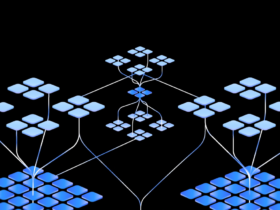Learn about the role of a network engineer. We answer the question of what is a network engineer in the world of modern communications.
Table of Contents:
Network Engineering
Nowadays, seamless communication is vital for organisations across all industries. From facilitating day-to-day operations to supporting remote work, businesses rely on robust and secure networks to ensure data and resources can be accessed anytime, anywhere. Behind the scenes, network engineers work tirelessly to design, implement, manage, and secure these complex infrastructures. They are the architects and caretakers of networks that keep organsations functioning smoothly.
Who Is a Network Engineer?
A network engineer is an IT professional responsible for ensuring that an organisation’s networking infrastructure is operational, secure, and optimised. They work with a variety of networking technologies and services, including Local Area Networks (LANs), Wide Area Networks (WANs), cloud-based networks, and wireless systems. The scope of their work can range from handling small in-house networks to overseeing vast global communication systems in large enterprises.
Network engineers are distinct from network administrators, though the roles often overlap. While network administrators typically handle the day-to-day management and maintenance of a network, network engineers focus on the high-level design, optimisation, and troubleshooting of these systems. The role of a network engineer is both strategic and technical, making them an integral part of any organisation’s IT ecosystem.
Key Responsibilities of a Network Engineer
1. Network Design and Planning
At the heart of the network engineer’s role is designing a network architecture that meets an organisation’s unique needs. Whether the goal is to support a small office, a global corporation, or a hybrid remote workforce, the network must be scalable, secure, and reliable. Network engineers must anticipate future growth and technological developments, ensuring that the network is flexible enough to accommodate expansion and new technology without requiring a complete overhaul.
This design process involves selecting appropriate hardware (like routers, switches, and firewalls), choosing the right protocols for communication, and designing a network topology that optimises speed and performance. They often work with key stakeholders, such as senior IT managers or executives, to align the network design with the company’s strategic goals.
2. Installation and Configuration
Once a network has been designed, network engineers handle the deployment phase, ensuring the physical and virtual components are installed and configured correctly. This involves setting up networking hardware such as routers, switches, and firewalls, and configuring them to ensure the smooth flow of data across the network.
Network engineers are also responsible for setting up wireless access points, ensuring seamless connectivity across different locations or departments, and ensuring that network configurations allow for both internal and external communications. During installation, they must account for potential future scalability, ensuring that the network can accommodate growth with minimal disruption.
3. Monitoring and Maintenance
Network performance is dynamic, and maintaining a network is an ongoing task that requires constant monitoring. Network engineers leverage monitoring tools to assess bandwidth usage, identify bottlenecks, and ensure that data is flowing efficiently. The goal is to ensure optimal functionality and to preempt any potential issues that may arise.
Regular maintenance is also a critical aspect of the job. Network engineers perform updates on firmware and software to keep systems running efficiently and securely. They implement necessary patches to safeguard the network against known vulnerabilities, bugs, or performance issues.
4. Security Implementation
Securing a network is one of the most critical responsibilities of a network engineer. They are tasked with protecting the organisation’s sensitive data and infrastructure from both external and internal threats.
Network engineers implement various security measures, such as firewalls, encryption protocols, intrusion detection/prevention systems (IDS/IPS), and Virtual Private Networks (VPNs). They ensure that data traveling across the network is encrypted and that unauthorised users are blocked from accessing sensitive areas of the network.
Additionally, network engineers often conduct security audits and vulnerability assessments to identify potential risks. This ensures that they can proactively implement measures to safeguard the network from potential breaches. A well-secured network not only protects data but also instills confidence in clients and partners that their information is safe.

5. Network Troubleshooting
Despite the best efforts to maintain and secure a network, issues can still arise. When they do, network engineers are responsible for identifying and resolving problems as quickly as possible. This could range from a localised issue like a malfunctioning router to broader problems such as slow network performance across multiple locations.
Troubleshooting often involves diagnosing hardware malfunctions, identifying software configuration errors, and analysing network traffic to pinpoint bottlenecks or unusual patterns. Quick and effective problem-solving is critical to minimising downtime and ensuring business continuity.
6. Upgrades and Optimisation
As technology evolves, network engineers must stay ahead of trends to ensure their networks remain up-to-date and efficient. This may involve upgrading outdated hardware, deploying new technologies like SD-WAN (Software-Defined Wide Area Networks) or implementing automation tools to streamline network management.
Optimisation isn’t just about upgrading; it’s also about improving efficiency within the existing network. Network engineers continually assess the network’s performance and implement tweaks to reduce latency, improve bandwidth usage, and ensure that systems are running at peak efficiency.
7. Collaboration with Other IT Staff
Network engineers do not work in isolation. They frequently collaborate with other members of the IT team, including systems administrators, security specialists, and software developers. These collaborations ensure that the network integrates smoothly with other IT systems, such as servers, databases, and business applications.
Effective communication between network engineers and other departments is critical. For example, when rolling out a new application, the network team must ensure that it integrates smoothly with the existing infrastructure and that it won’t cause a strain on network resources. This requires a deep understanding of both network technologies and the specific needs of other teams within the organisation.
8. Documentation and Reporting
Documentation is an often-overlooked aspect of a network engineer’s job but is essential for long-term maintenance and troubleshooting. Engineers must create detailed records of network configurations, system changes, and incident reports. These documents are used for troubleshooting, training, and future upgrades.
Keeping accurate documentation also ensures that when changes are made there’s a clear paper trail. Such as new devices being added or reconfigurations being implemented. This not only aids in faster troubleshooting but also provides valuable information for auditing or compliance purposes.
The Skills and Knowledge Required
Becoming a network engineer requires a combination of technical knowledge, problem-solving abilities, and adaptability. Below are some of the essential skills a network engineer must possess.
- Deep Understanding of Networking Protocols: Knowledge of protocols such as TCP/IP, DNS, DHCP, and MPLS is crucial for managing network communication.
- Routing and Switching Expertise: Experience in configuring and managing routers and switches from brands like Cisco or Juniper is often a core requirement.
- Security Knowledge: Understanding firewalls, VPNs, encryption protocols, and IDS/IPS systems is essential for safeguarding the network.
- Problem-Solving Skills: Being able to quickly diagnose and resolve issues ensures minimal downtime and operational disruption.
- Programming/Scripting: In some cases, knowledge of programming or scripting languages like Python is beneficial for automating network tasks.

Our Final Thoughts
In a world where technology underpins almost every business operation, the role of the network engineer has never been more important. They design and maintain the backbone of organisational communication, ensuring that data flows securely and efficiently. Network engineers are not just technicians; they are strategic thinkers, continuously improving the infrastructure that keeps the digital world connected. As businesses continue to expand their digital footprint, the demand for skilled network engineers will only grow, solidifying their role as critical players in the modern workforce.












